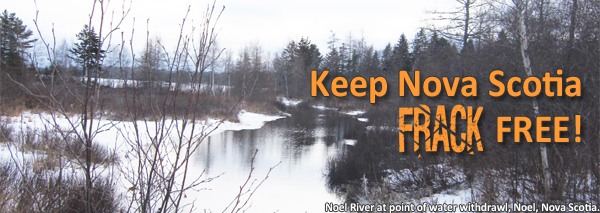The Council of Canadians is pleased that Bill 6 — which places a legal moratorium on high-volume hydraulic fracturing — has passed in Nova Scotia. The bill passed on November 14 with the governing Liberals and opposition New Democrats voting in support of it. The Progressive Conservatives voted against the legislation.
The Chronicle-Herald reports, “The bill, which came following the release of the Wheeler report, extends a moratorium on ‘high-volume hydraulic fracturing’ in shale formations until the government can develop regulations and an onshore atlas of available natural gas resources.”
In October 2013, a poll commissioned by the Council of Canadians, the Nova Scotia Fracking Resource and Action Coalition and the Sierra Club showed that 69 per cent of Nova Scotians strongly support or support a continued moratorium on fracking. We also encouraged the public through our action alert Let’s keep Nova Scotia frack-free to make written submissions to the independent review panel whose recommendations informed Bill 6. In June 2014, we wrote a letter to Premier Stephen McNeil urging him to place a ban on fracking in Nova Scotia given the host of grave concerns raised in a Council of Canadian Academies report. In July we said that the moratorium on fracking must remain in place until the Mi’kmaq community consents to a change. And we called on our supporters and the public to show their support for a moratorium on fracking by requesting a meeting with their MLA as well as posting signs, banners or stickers on their houses and cars.
While we are pleased that the legislation has now passed, it is not ideal.
The Council of Canadians is a member of the Nova Scotia Fracking Resource and Action Coalition (NOFRAC). Last month, the Chronicle-Herald reported, “The Nova Scotia Fracking Resource and Action Coalition said [the bill has] shortcomings when it comes to a definition for fracking, community consent and exemptions for research.” Concerns were expressed that the bill does not include a requirement for community consent before fracking is permitted, that it is specifically aimed at high-volume hydraulic fracturing in shale rock formations, and that fracking would be defined in regulations rather than in the bill.
Our Halifax-based Atlantic regional organizer Angela Giles raised these concerns when she spoke at legislative hearings on the draft bill in late October.
In terms of next steps, “[Energy minister Andrew] Younger said the next immediate step would be to develop a definition of high-volume hydraulic fracturing for inclusion in the regulations. …Younger said he expects regulations for the definition to be open for a 30-day comment period in December or January. Regulations for onshore develop are a work in process, he said.”
Unfortunately, “The legislation is not meant to provide a permanent moratorium, Younger said, but is intended to give the government time to ‘put in place all of the things that are necessary.’ That includes the duty to consult with First Nations and managing relationships with municipalities, he said. Younger said the Wheeler report’s estimate that it could be decades before the province is ready for fracking is probably too long, but he wasn’t prepared to give his own estimate.”
The Council of Canadians will continue to organize for a permanent moratorium against fracking.




